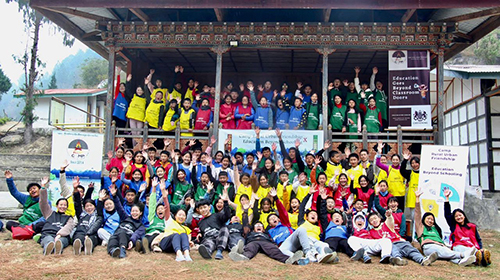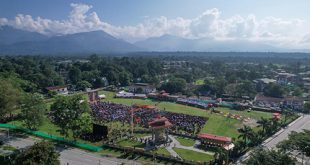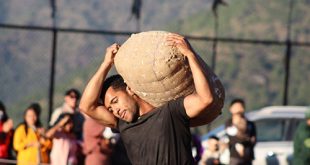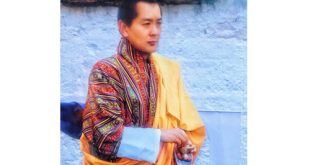Camp Rural Urban Friendship (RUF), in collaboration with BCMD is organising a camp to empower children to interpret, imagine, and articulate their vision of the Gelephu Mindfulness City (GMC) through participatory community mapping, reflection, and foster a sense of civic ownership in the nation-building process. A team from GMC will be coming to the camp for the Creative City Builders workshop.
The rest of the program is mostly designed by youth under 24, making it a camp by the youth, for the youth. Children will engage in activities that are very different from traditional classroom learning, focusing on self-leadership, teamwork, and activity-based learning.
Under the theme “Mindful Voices, Shared Futures,” the camp will engage children as co-creators of Bhutan’s future, encouraging them to connect civic imagination with national aspirations. This participatory process aims to build a strong social foundation for GMC by nurturing a generation that internalises the values of mindfulness, prosperity, and innovation not just as abstract ideals, but as guiding principles for community and national life.
A former camper Jigme Chogyel Dolkar said, “I learned the value of stepping out of my comfort zone – whether through the activities or team challenges with people I had never met before. I started looking at situations with a more open and flexible mindset. Another big part was the friendships. Camp showed me that genuine connections can be formed with anyone regardless of age, background or personality. It taught me to appreciate different perspectives and to be more patient and understanding. Overall, Camp RUF helped me grow more confident, more reflective and more open to new experiences.”
Ngawang Sherab Wangdi, another former camper said, “Camp RUF truly changed the way I look at people. I learned that ‘first impression is not the last impression.’ When I first met participants from different dzongkhags, I found some of them a bit distant and difficult to connect with. But by the end, they became the people I felt closest to. I also learned how to communicate with people I had never met before, something I never imagined I could do. And most importantly, Camp RUF taught me that friendship has no boundaries. It doesn’t matter whether someone is rich or poor, what really matters is respect, support, and love.”
One of the camp organisers, Namgyel Wangchuk, said, “The 10-day immersive camp in GMC for 108 children will be held from 22nd December 2025 till 1st January 2026. The recruitment for the participants is based on Equity Diversity Inclusion (EDI), which involves the dzongkhags with a high poverty index and the indigenous communities, including the highlands.”
The number 108 is chosen for its symbolic and practical value. In Buddhist tradition, 108 signifies wholeness and mindfulness, reflecting the project’s aim to nurture balanced, compassionate citizens aligned with the Gelephu Mindfulness City vision.
All effort has been placed to bring in as many children as possible, however, due to logistics the camp has been able to get only 4-5 children from each dzongkhag.
Namgyel said that the camp is designed for the 12–18 years age group because this period represents a critical phase in their teenage years, where young people are developing their sense of identity, building social skills, and learning to navigate greater independence and responsibility.
A BCMD program official said, “Although GMC is still in its formative phase, the project leverages this unique moment to nurture civic imagination and mindfulness, allowing children to envision how prosperity, innovation, and spirituality can coexist through a child-centred lens. The eight GMC core sectors serve as the conceptual foundation for all learning experiences.”
The project adopts a child-centred, participatory, and creative learning approach that enables children to interpret, understand and engage with His Majesty’s vision of the GMC, as Bhutan’s future citizens.
The eight GMC sectors are adapted into child-friendly learning themes to help participants understand Bhutan’s development priorities through participatory and creative processes. These sectors set the broad developmental framework for what the City aspires to become. However, while these sectors provide an architectural and economic blueprint, the social and human dimension of this transformation, how it will feel to live, learn, and grow within such a city remains to be imagined and articulated.
 The Bhutanese Leading the way.
The Bhutanese Leading the way.




